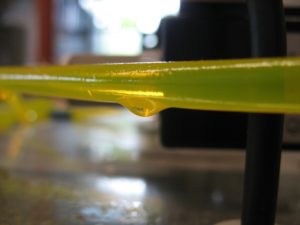Materials
Resistance of Materials to Alternative Fuels
Liquid alternative fuels have other physical-chemical characteristics than fossil energy carriers. This affects the combustion properties and the storage stability of pure alternative fuels and of mixtures of fossil and alternative fuels. Furthermore, in heating systems unwanted interactions can occur with materials that come into contact with the mixtures. Metals can corrode, synthetics can swell and, as a consequence, leakage may occur.

Biofuels can diffuse through synthetic hoses. Photo: OWI
In heating systems plastic pipes, seals, filters or filter bowls can be affected as well as tanks. The compatibility of the used materials with the fuel has to be guaranteed for the heating system or for automotive applications. In this context, OWI carries out projects in cooperation with research partners, who are experts in the field of plastics, and with partners from the industry. The behaviour of plastics and elastomers in mixtures of heating oil and fatty acid methyl esters is studied by long-term immersion tests. The specimens are visually examined and weight gain, tensile strength, hardness and impact strength are measured.
Recently, on the basis of the results of such investigations, producers were able to give their clients reliable information and recommendations about which shares of biogenic fuels can be maximally used in their heating systems. Moreover, OWI supports producers with the development of new plastic materials which may be deployed in oil-fueled heating systems in the near future, thereby taking into account that the fraction of fuels from renewable sources tends to increase.
